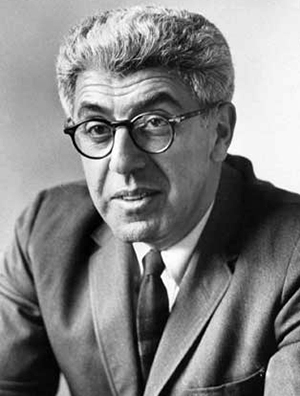
Barry Commoner (May 28, 1917 – September 30, 2012) was an American biologist, college professor, and politician. He was a leading ecologist and among the founders of the modern environmental movement. He ran for president of the United States in the 1980 U.S. presidential election on the Citizens Party ticket. He served as editor of Science Illustrated magazine. (Click here for full Wikipedia article)
-----
After all, despite the economic advantage to firms that employed child labor, it was in the social interest, as a national policy, to abolish it- removing that advantage for all firms.
All of the clean technologies are known, it's a question of simply applying them.
As the earth spins through space, a view from above the North Pole would encompass most of the wealth of the world- most of its food, productive machines, doctors, engineers and teachers. A view from the opposite pole would encompass most of the world's poor.
Earth Day 1970 was irrefutable evidence that the American people understood the environmental threat and wanted action to resolve it.
Environmental concern is now firmly embedded in public life: in education, medicine and law; in journalism, literature and art.
Environmental pollution is an incurable disease. It can only be prevented.
Environmental quality was drastically improved while economic activity grew by the simple expedient of removing lead from gasoline- which prevented it from entering the environment.
I don't believe in environmentalism as the solution to anything. What I believe is that environmentalism illuminates the things that need to be done to solve all of the problems together.
I see no reason to have my shirts ironed. It's irrational.
If you ask what you are going to do about global warming, the only rational answer is to change the way in which we do transportation, energy production, agriculture and a good deal of manufacturing. The problem originates in human activity in the form of the production of goods.
If you can see the light at the end of the tunnel, you are looking the wrong way.
In every case, the environmental hazards were made known only by independent scientists, who were often bitterly opposed by the corporations responsible for the hazards.
It reflects a prevailing myth that production technology is no more amenable to human judgment or social interests than the laws of thermodynamics, atomic structure or biological inheritance.
Nature knows best.
No action is without its side effects.
Nothing ever goes away.
Seen that way, the wholesale transformation of production technologies that is mandated by pollution prevention creates a new surge of economic development.
The age of innocent faith in science and technology may be over.
The environmental crisis arises from a fundamental fault: our systems of production- in industry, agriculture, energy and transportation- essential as they are, make people sick and die.
The environmental crisis is a global problem, and only global action will resolve it.
The first law of ecology is that everything is related to everything else.
The modern assault on the environment began about 50 years ago, during and immediately after World War II.
The most meaningful engine of change, powerful enough to confront corporate power, may be not so much environmental quality, as the economic development and growth associated with the effort to improve it.
The wave of new productive enterprises would provide opportunities to remedy the unjust distribution of environmental hazards among economic classes and racial and ethnic communities.
What is new is that environmentalism intensely illuminates the need to confront the corporate domain at its most powerful and guarded point- the exclusive right to govern the systems of production.
-----
(September 30 is also the birthday of Truman Capote and Elie Wiesel.)
Categories: Barry Commoner, Quotes of the day
Home KGB on Bluesky KGB on Substack
KGB Stuff Commentwear E-Mail KGB
Donate via PayPal

















